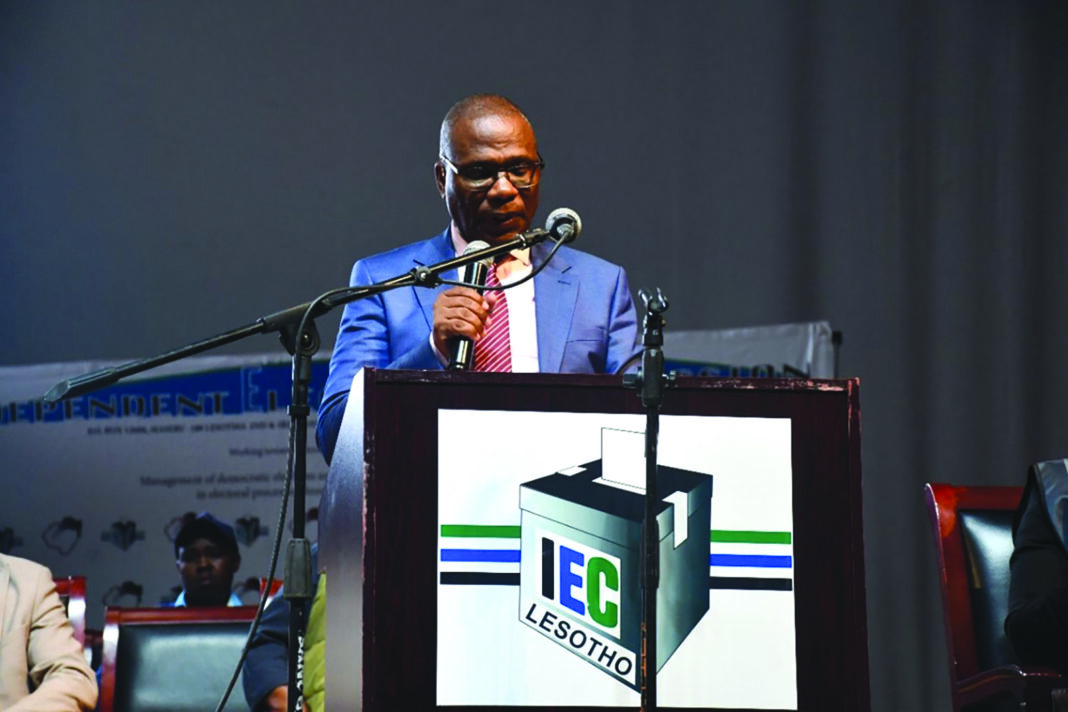Kamohelo Makhofola
In a blistering critique, the Independent Electoral Commission (IEC) has unleashed a damning indictment against political parties and parliament, leveling accusations of obstinacy in the face of urgent national reform demands.
“The national reforms agenda presents a golden opportunity for fast-tracking electoral reforms. However, the intransigence of political parties and parliament in undertaking the national reforms programme means the institutions, including IEC, remain unreformed and therefore handicapped from effectively contributing to meaningful democratic governance and development,” stated IEC in its strategic blueprint for the period 2024 to 2028.
The strategic plan, a joint effort with backing from the United Nations Development Programme (UNDP) and the German government, was officially unveiled in Maseru yesterday.
Bemoaning the abject failure of political parties to deliver on the promises of democratic dividends, IEC highlighted the crippling effects on citizen participation in the electoral process.
It said despite extensive outreach efforts, voter turnout has plummeted as disillusioned voters question the efficacy of elections amidst their daily struggles and economic hardships.
“Despite our outreach efforts, we have witnessed a sharp decline in voter turnout because voters are questioning the value of the addition of elections to their daily struggles and economic conditions,” IEC said.
It further stated that the proliferation of political parties, while initially signaling the vibrancy of Lesotho’s multi-party politics, has spiraled out of control, leading to dire consequences.
With a staggering 52 registered political parties participating in the 2022 national assembly elections, IEC said the thin distribution of voters has resulted in razor-thin victories for the majority party, perpetuating a cycle of instability and uncertainty.
Moreover, the exponential rise in political parties has placed an unsustainable administrative burden on the IEC, straining its already limited resources.
“The inordinately high number of political parties contributes to an administrative burden on IEC’s capacity because it is expected to manage the electoral process and distribute the political party funds to all the parties.
“There is usually no matching increase in the parliamentary allocation of budget to the IEC and increase in its staff complement,” it said.
The reforms, meant to usher in a new era of stability in the country, are the result of years of discussions among political parties, civil society, and other role players, mediated by the Southern African Development Community (SADC).
In 2022 after parliament failed to pass the 10th Amendment to the Constitution Bill 2022, commonly known as the Omnibus Bill, before its five-year term expired and following pressure from several quarters, the Council of State advised then-prime minister Dr Moeketsi Majoro to declare a state of emergency one of two conditions under which a dissolved parliament can be recalled.
The Omnibus Bill, a comprehensive piece of legislation, seeks to address critical deficiencies in Lesotho’s political landscape. It aims to amend key provisions related to political parties, floor-crossing in parliament, the appointment of senior officials, and the role of the prime minister.
When he declared a state of emergency, Majoro said failure to pass the Bill meant the continuation of unchecked politicisation of the public service, including the security agencies, loopholes in the constitution, formation of coalition governments, unregulated floor crossing in parliament, and inadequate regulation of political parties.
He said these issues had been identified as factors undermining political stability, justice, and peace in the country. He further indicated that the current political climate posed a substantial threat, risk, and danger to the country’s stability and prosperity.
“Unless the stated undesirable condition is addressed, it is likely to be beyond the control and escalate thus causing more threat to the peace, safety, and stability of the Basotho nation,” Majoro said.
After the state of emergency was declared, His Majesty King Letsie III recalled parliament to pass the omnibus bill and the National Assembly Electoral Act Amendment Bill.
The two bills and many other bills were consequently passed but on September 12, 2022, the High Court (sitting as the Constitutional Court) concluded that the state of emergency, as well as the reconvening of parliament, were null and void.
All laws passed by the recalled parliament were also declared null and void.
Chief Justice Sakoane Sakoane, as well as two judges of the high court, Justice Tšeliso Monapathi and Justice Mafelile Ralebese, presided over the case.
Majoro and the attorney general, advocate Rapelang Motsieloa, appealed the high court ruling but the court of appeal on September 19, 2022, dismissed their appeal with costs.
In June 2023, a glimmer of hope emerged as the government and leaders of political parties in parliament joined forces to sign an agreement aimed at expediting and supporting the passage of the Omnibus Bill.
However, this ray of optimism was short-lived. In August 2023, an attempt to resurrect the Omnibus Bill in parliament to the state it had reached before the previous parliament was dissolved faced a challenge in the High Court.
The move, which sought to revive the bill and resume deliberations from where they had left off, encountered legal hurdles that derailed the reform process once again.
Despite the High Court asserting the parliament’s authority to reinstate dormant bills, the Appeal Court in November 2023 decided against the process of the reinstatement of the bills.




